
Find Help
More Items From Ergsy search
-

Are there risks associated with blood transfusions?
Relevance: 100%
-
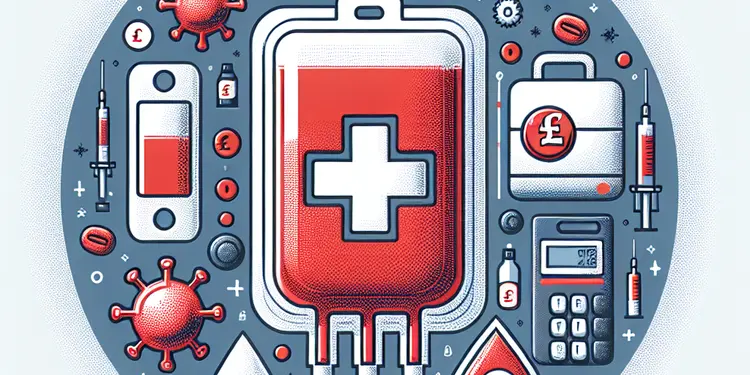
Is HTLV a risk in blood transfusions?
Relevance: 97%
-
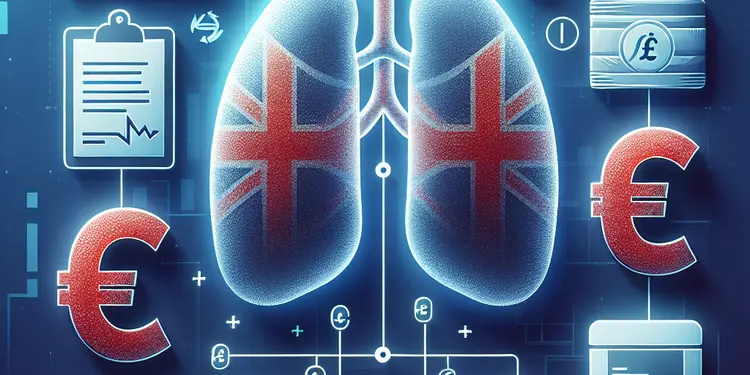
Is Hepatitis B a risk in blood transfusions?
Relevance: 96%
-

Blood Product Transfusions
Relevance: 86%
-
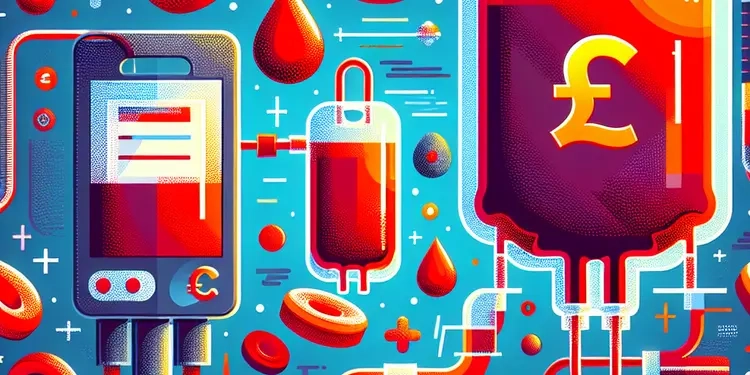
What is a blood transfusion?
Relevance: 86%
-

Blood Transfusion
Relevance: 83%
-

Is there an age limit for receiving blood transfusions?
Relevance: 80%
-

What diseases can be spread by blood transfusions?
Relevance: 77%
-
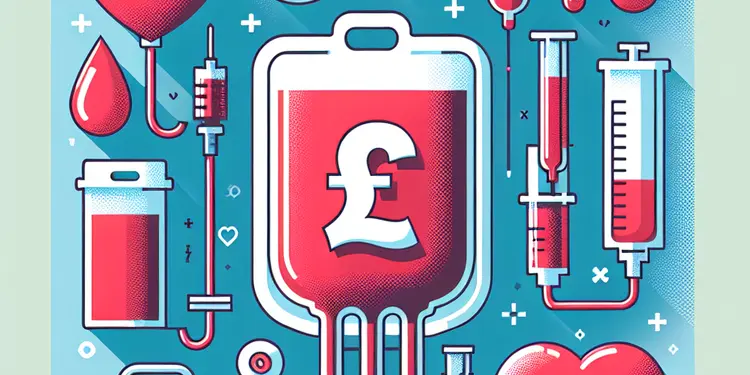
Can HIV be transmitted through blood transfusions?
Relevance: 76%
-

Is Chagas disease a concern with blood transfusions?
Relevance: 76%
-
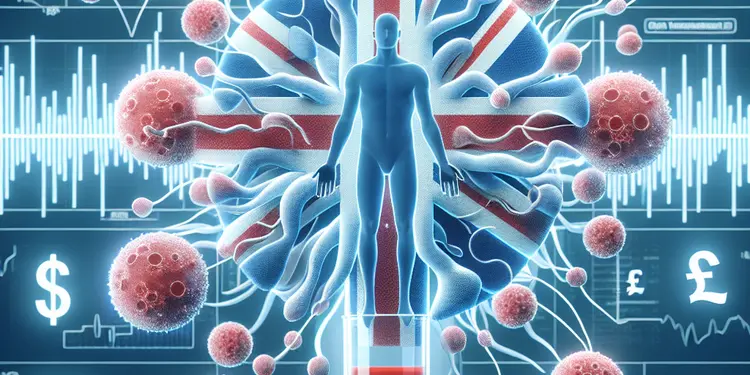
Can syphilis be transmitted via blood transfusion?
Relevance: 75%
-

Why might someone need a blood transfusion?
Relevance: 75%
-
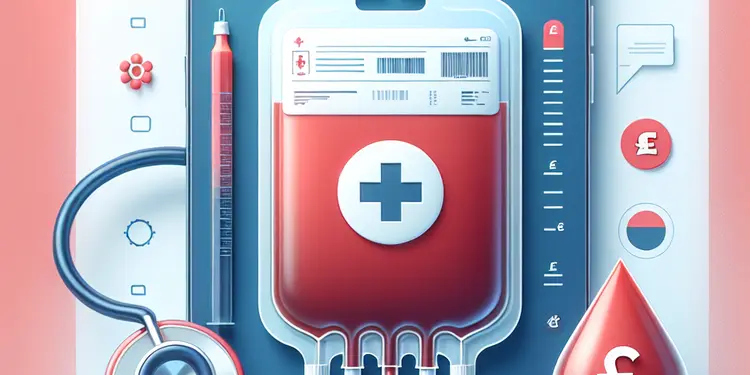
Can bacterial infections be transmitted through blood transfusion?
Relevance: 75%
-

Is Zika virus screened for in blood transfusions?
Relevance: 74%
-

Are there any parasites that can be transmitted through blood transfusions?
Relevance: 74%
-

Is malaria still a concern for blood transfusion safety?
Relevance: 74%
-
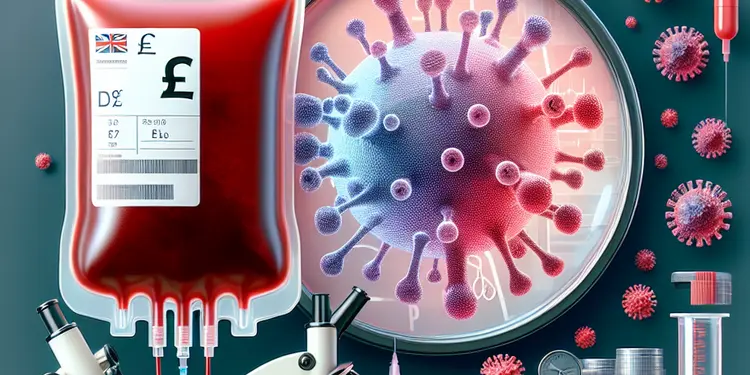
What is the most common disease transmitted by blood transfusion?
Relevance: 74%
-
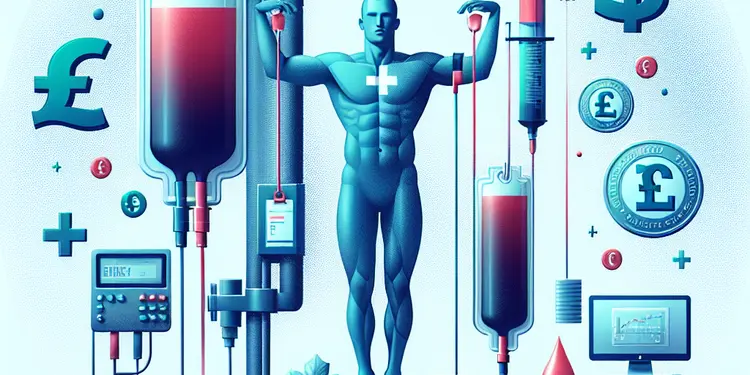
Can someone have a reaction to a mismatched blood transfusion?
Relevance: 74%
-
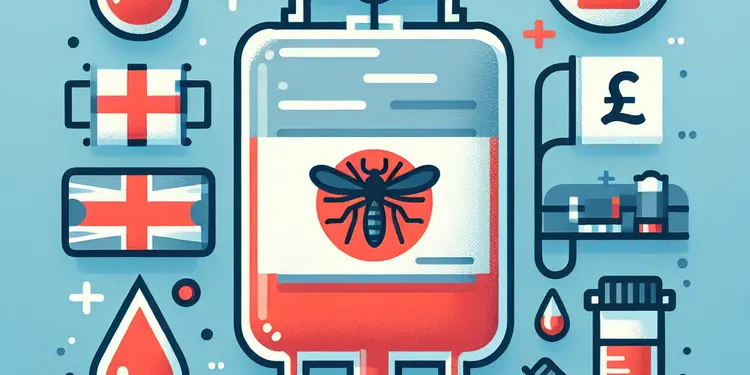
Can Dengue fever be transmitted through blood transfusions?
Relevance: 73%
-
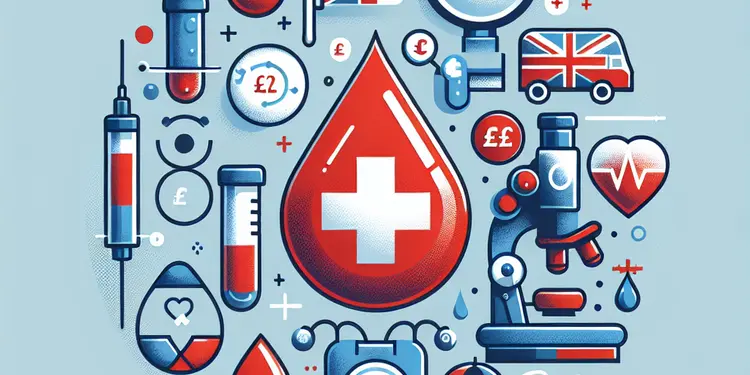
How do healthcare providers match blood for transfusions?
Relevance: 73%
-

What types of blood products can be transfused?
Relevance: 73%
-
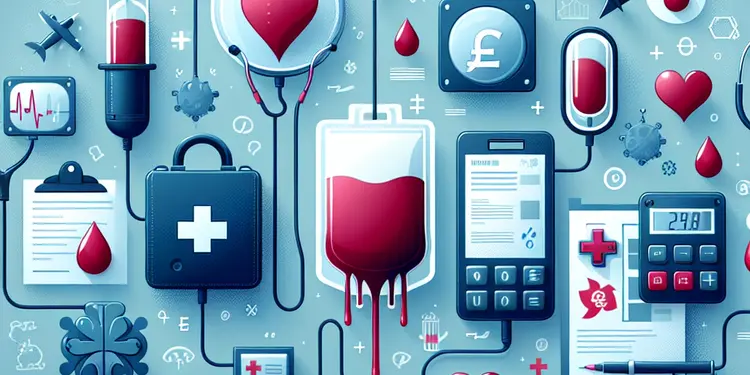
Can certain medical conditions prevent receiving blood transfusions?
Relevance: 73%
-
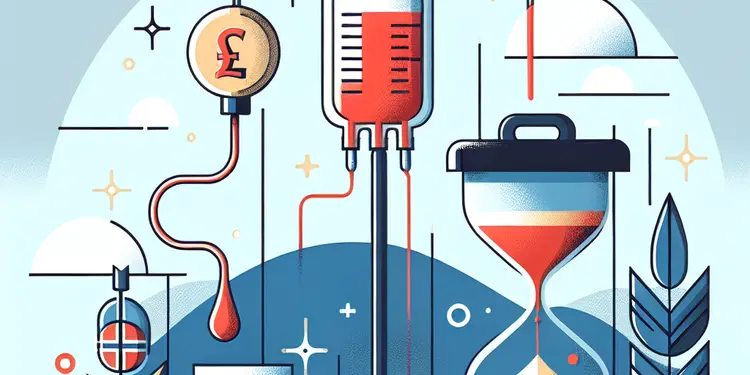
How long does a blood transfusion take?
Relevance: 72%
-
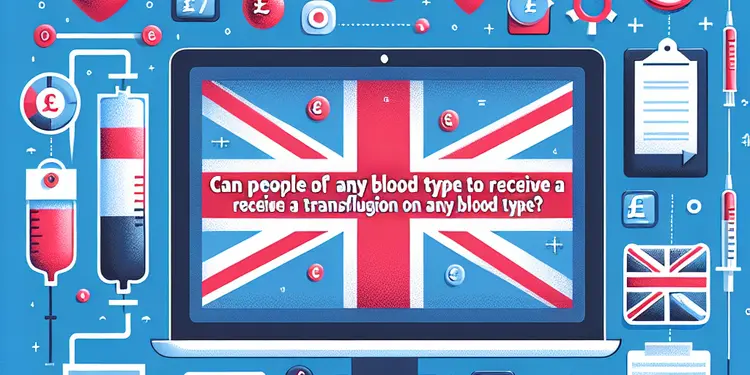
Can people of any blood type receive a transfusion of any blood type?
Relevance: 72%
-
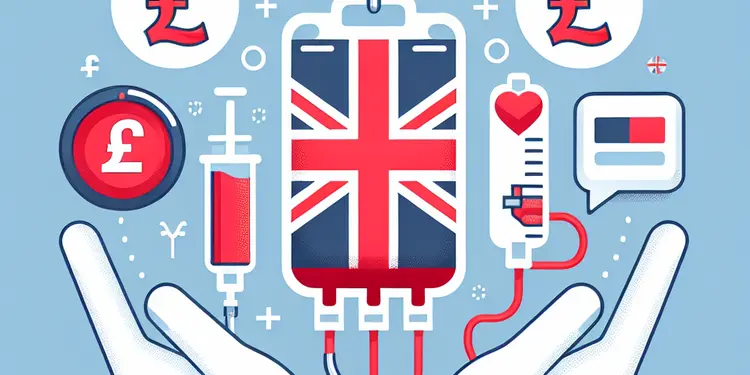
Can COVID-19 be transmitted through blood transfusions?
Relevance: 71%
-
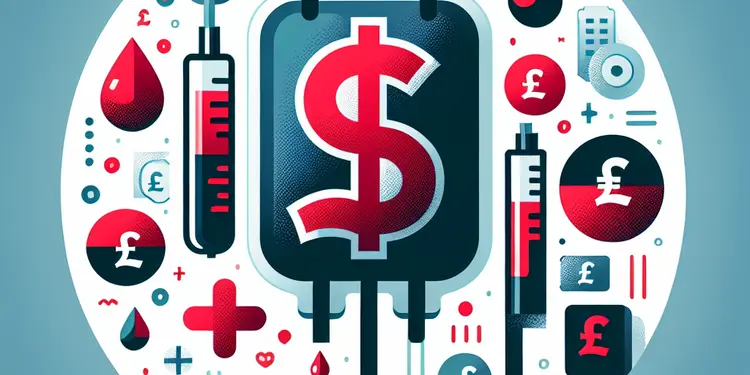
What are some common reasons blood transfusions are needed?
Relevance: 71%
-
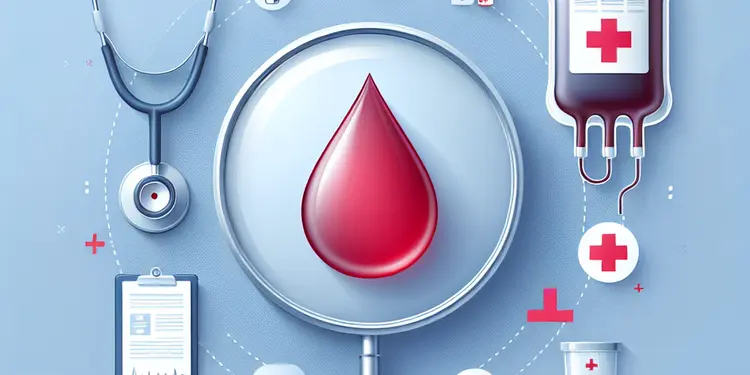
How do doctors determine how much blood is needed for a transfusion?
Relevance: 71%
-
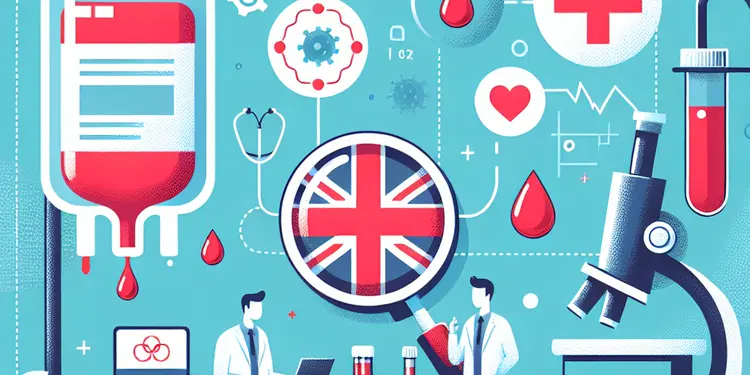
Can you get any prion diseases from blood transfusion?
Relevance: 68%
-
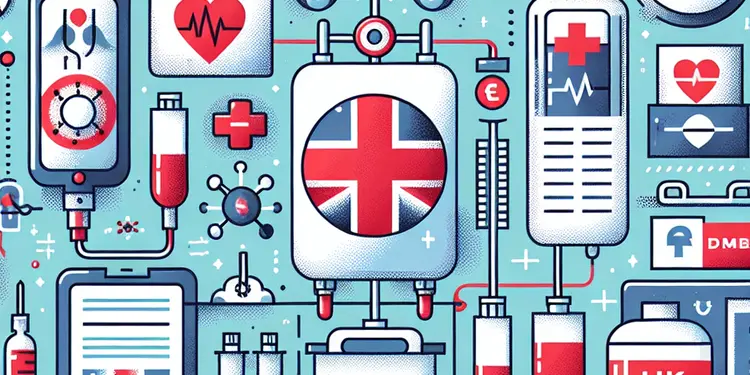
What measures are taken to prevent disease transmission in blood transfusions?
Relevance: 66%
-

Are new emerging pathogens a risk for blood safety?
Relevance: 63%
-

Is blood used for transfusions safe?
Relevance: 60%
-

Can cytomegalovirus (CMV) be spread through transfusions?
Relevance: 59%
-

What is plasma, and why might it be transfused?
Relevance: 59%
-

Are there global differences in screening for blood transfusions?
Relevance: 56%
-
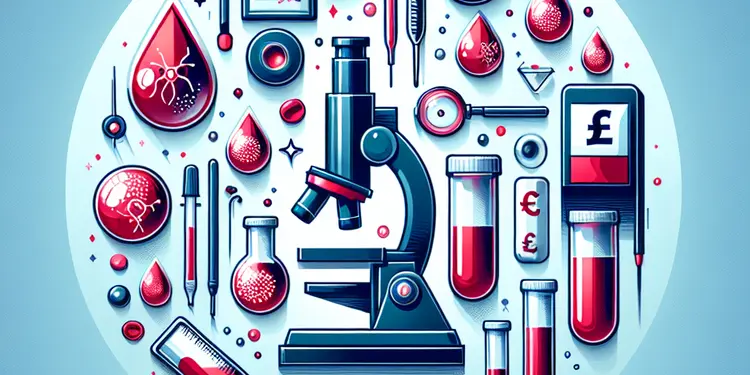
How is blood screened to prevent disease transmission?
Relevance: 53%
-
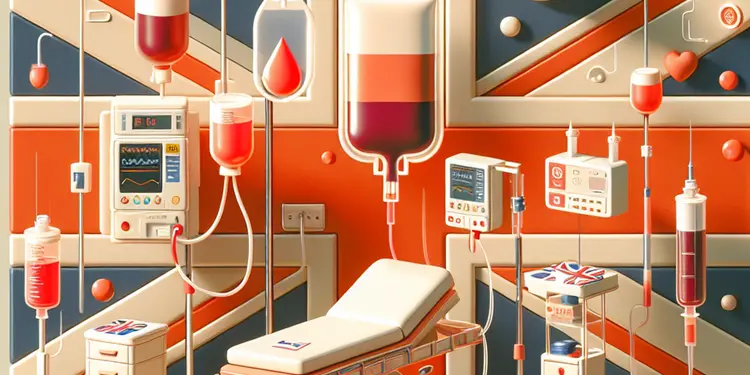
What should a patient expect after a blood transfusion?
Relevance: 50%
-
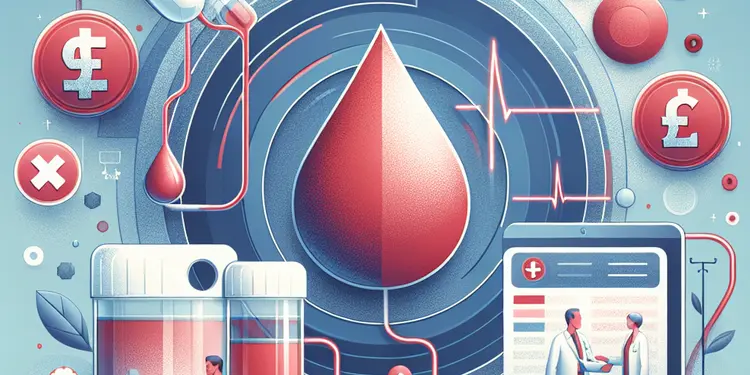
What kind of follow-up care is needed after a blood transfusion?
Relevance: 50%
-

What are the risks of having high blood pressure?
Relevance: 47%
-

What other viruses are tested for in blood donations?
Relevance: 45%
-

What are the risks associated with a C-section?
Relevance: 41%
Introduction to Blood Transfusions
Blood transfusions are a common medical procedure in which donated blood or blood components are transferred into a patient’s bloodstream. This procedure is essential in many situations, such as surgery, trauma, or conditions that cause low blood counts. While generally safe, there are some risks associated with blood transfusions that patients and healthcare providers should be aware of, especially in the UK where specifics of healthcare practices and procedures might differ from other regions.
Common Risks of Blood Transfusions
One of the most common risks associated with blood transfusions is an allergic reaction. These reactions can range from mild to severe and can occur even when the blood is a perfect match. Symptoms may include hives, itching, or fever. In rare cases, more severe reactions like anaphylaxis can occur, necessitating immediate medical attention.
Another risk is febrile non-hemolytic transfusion reactions, which are characterized by a sudden fever and chills during or shortly after the transfusion. Although these are usually not dangerous, they can be uncomfortable for the patient.
Infectious Risks
Infectious risks, although extremely low due to rigorous testing, are another concern. Blood donations in the UK are screened for various infectious agents, including viruses such as HIV, Hepatitis B, and Hepatitis C. The UK has stringent procedures in place to ensure that the risk of transmitting infections through blood transfusions is minimized.
Immune System Complications
Transfusion-related acute lung injury (TRALI) is a rare but serious complication that can occur when antibodies in the donated blood cause a reaction. This condition affects the lungs and can lead to acute respiratory distress.
Another risk is the development of alloimmunization, where the patient's immune system creates antibodies against the transfused blood cells. This can complicate future transfusions or pregnancies because of the body's increased likelihood of rejecting transfused blood.
Iron Overload
Patients who require multiple transfusions, such as those with chronic anemia, risk iron overload. This condition occurs when excess iron builds up in the body, potentially leading to damage to organs such as the liver and heart. It's important that these patients are monitored closely and receive treatment to manage iron levels if necessary.
Mitigating Risks
The UK National Health Service (NHS) implements strict guidelines to ensure that blood transfusions are as safe as possible. Healthcare providers must obtain informed consent from patients, discussing potential risks and benefits before proceeding with a transfusion. Compatibility testing (crossmatching) is also performed rigorously to ensure a match between donor and recipient blood.
Conclusion
While there are risks associated with blood transfusions, advances in screening and hospital procedures have significantly reduced these risks. Patients in the UK can feel confident that blood transfusions are performed with safety as a paramount concern, although being informed about potential risks is always beneficial.
Introduction to Blood Transfusions
A blood transfusion is when you get blood from someone else. This helps when you are sick or hurt. Doctors use blood transfusions during surgery or if you have low blood. It's usually safe, but there are some risks. In the UK, things might be a bit different from other places in the world.
Common Risks of Blood Transfusions
You might have an allergic reaction from a blood transfusion. This could make you itchy or cause hives or fever. Sometimes it can be very serious, and you would need to see a doctor right away.
Some people get a fever and chills. This might happen during or after a transfusion. It's not usually dangerous, but it can make you feel unwell.
Infectious Risks
There is a very small chance you could get an infection from a blood transfusion. But in the UK, blood is checked very carefully to make sure it is safe from viruses like HIV or Hepatitis.
Immune System Complications
Sometimes, your body might not like the blood. This is rare. It can cause problems with your lungs or make it harder for you to get more blood in the future.
Iron Overload
If you get a lot of transfusions, too much iron can build up in your body. This is called iron overload. It might harm your liver or heart. Doctors will watch your iron levels closely and help you if needed.
Mitigating Risks
In the UK, doctors follow strict rules to keep blood transfusions safe. They talk to you about the benefits and risks before giving you blood. They also test to ensure the blood is a good match for you.
Conclusion
Even though there are some risks, getting a blood transfusion is much safer now because of testing and careful procedures. In the UK, you can feel reassured about the safety of blood transfusions. Knowing about the risks helps you be more informed.
Frequently Asked Questions
What are the risks associated with blood transfusions?
Blood transfusions are generally safe, but like any medical procedure, they carry some risks, including allergic reactions, fever, iron overload, and in rare cases, infection or acute immune hemolytic reaction.
Can blood transfusions cause infections?
The risk of contracting infections from a blood transfusion is extremely low due to rigorous screening and testing of donated blood, but there is still a very small possibility.
What is an allergic reaction to a blood transfusion?
An allergic reaction can occur if the recipient's immune system reacts to proteins in the donor blood. Symptoms may include hives and itching, and it usually develops during or shortly after the transfusion.
What is an acute immune hemolytic reaction?
This rare but serious reaction occurs when the recipient's body attacks the transfused red blood cells, causing a breakdown of these cells. It can lead to symptoms like fever, chills, and dark urine.
How often do transfusion-related complications occur?
Serious complications from blood transfusions are rare, occurring in less than 1 in a million transfusions for some reactions.
What is febrile non-hemolytic transfusion reaction?
This is a common reaction where patients develop a fever and chills during or after a transfusion. It's generally not serious but can be uncomfortable.
Can a blood transfusion cause lung injury?
Transfusion-related acute lung injury (TRALI) is a rare complication that can occur when antibodies in the blood product damage the recipient's lung cells, leading to breathing difficulties.
What precautions are taken to ensure transfusion safety?
Blood is rigorously tested and cross-matched for compatibility before transfusion. Donors are screened for risk factors and infectious diseases to ensure safety.
What is iron overload, and how can it happen?
Iron overload can occur after multiple blood transfusions. This is because each transfusion introduces more iron into the body, which can accumulate over time, potentially leading to organ damage.
Can you have a transfusion reaction if you've had one before?
Yes, having had a previous transfusion reaction can increase the risk of having another, so the medical team may take additional precautions.
What should I do if I feel unwell after a blood transfusion?
It's important to inform your healthcare provider immediately if you experience symptoms like fever, rashes, difficulty breathing, or unusual symptoms after a transfusion.
Is there a risk of allergic reactions with allogeneic blood transfusions?
Yes, allergic reactions are possible with allogeneic transfusions, although most are mild and can be treated easily.
What is a delayed hemolytic reaction?
This reaction can occur days to weeks after a transfusion, where the body slowly destroys the transfused red blood cells. It may cause mild fever and jaundice.
What are the symptoms of a transfusion reaction?
Symptoms can include fever, chills, rash, itching, back pain, dark urine, or difficulty breathing. Seek immediate medical attention if these occur.
Can transfusions affect the immune system?
In rare cases, blood transfusions can lead to immune suppression or trigger immune reactions, but these are uncommon.
How does matching blood types prevent reaction risks?
Matching blood types ensures compatibility between donor and recipient, reducing the risk of the immune system attacking transfused blood cells.
What is a transfusion-associated circulatory overload?
This occurs when too much blood is transfused too quickly, leading to fluid overload and symptoms like coughing and difficulty breathing.
Are there alternatives to blood transfusions to avoid risks?
Alternatives include medications to boost blood production, iron supplements, or procedures that minimize blood loss during surgery.
Can I be pre-screened to reduce transfusion risks?
Yes, pre-transfusion testing includes typing and cross-matching your blood, reducing the chances of a reaction.
What steps can be done to minimize risks during a transfusion?
Careful monitoring during and after the transfusion, using the correct match, and ensuring the patient and donor's medical histories are well understood all help minimize risks.
What can go wrong with blood transfusions?
Blood transfusions usually help people. But sometimes, problems can happen. Here are some things to know: - **Reactions**: Sometimes the body might not like the new blood. This can make you feel sick. - **Infections**: Very rarely, bad germs in the blood can make you unwell. - **Iron Overload**: If you get lots of blood transfusions, you might get too much iron. This can be bad for your body. - **Breathing Problems**: Sometimes, blood transfusions can cause breathing trouble. If you or someone you know is having a blood transfusion, a doctor or nurse can help you understand more. **Supportive Tools**: 1. **Picture Cards**: Use cards or drawings to help explain what happens. 2. **Support Person**: Have someone with you who understands and can help explain. 3. **Ask Questions**: Always ask if you don't understand something.Blood transfusions are very safe. But, just like other medical things, there can be some risks. These risks include:
- Allergic reactions: This is when your body acts like it's allergic to the new blood.
- Fever: You might feel hot and get a temperature after a transfusion.
- Too much iron: Sometimes, your body can get extra iron from the new blood.
- Infection: It's rare, but sometimes the blood can have germs in it.
- Rare reaction: Sometimes, your immune system might attack the new blood. This is called an acute immune hemolytic reaction, but it doesn’t happen often.
If you don't understand something or need help with medical words, you can ask a doctor or nurse.
Can blood transfusions make you sick?
There is a very, very small chance of getting an infection from a blood transfusion. This is because the blood is checked very carefully. So, it is very safe.
What happens if your body reacts badly to new blood?
Sometimes, when you get new blood, your body might not like it. This is called a bad reaction.
Signs can be itchy skin, a rash, or feeling sick.
If you feel different after getting new blood, tell someone right away.
Sometimes, the person getting blood from someone else might have their body's guard system attack the new blood. This is because of certain parts called proteins. When this happens, they might get red bumps on their skin and feel itchy. This can happen while they are getting the blood or just after.
What is a fast immune blood reaction?
A fast immune blood reaction happens when your body attacks new blood after a blood transfusion. It's like your body thinks the new blood is a bad guy and tries to get rid of it.
If you or someone you know is learning about this, try using pictures and ask someone to explain it in simple words. You can also find videos that show and explain what happens.
Sometimes, your body might attack new blood you get from a transfusion. This doesn't happen often, but it can be dangerous. You might get a fever, feel cold, or have dark-colored pee if this happens.
If reading is hard, you can try using an audiobook or ask someone to help read it with you. You can also use text-to-speech tools to have the text read out loud.
How often do problems happen after a blood transfusion?
Sometimes, when people get new blood called a blood transfusion, they can have problems. These problems can happen, but they don't happen a lot.
If you want to learn more or need help understanding, you can: - Use a computer or phone to listen to the information. - Ask someone you trust to help explain it to you.
Problems from getting blood from someone else are not common. They happen very rarely, less than 1 time in a million.
When this does happen, it is called a "reaction."
If you find the words tricky, you can try using a tool that reads it aloud for you. This might help you understand better.
What is a fever reaction from a blood transfusion?
A fever reaction can happen after getting blood from someone else. It means your body is getting warmer than usual.
This can happen because your body reacts to the new blood. It is not harmful, but you might feel uncomfortable.
If you feel unwell, you should tell the doctor or nurse. They can help you feel better.
Some tools that can help you understand more are:
- Picture cards explaining blood transfusions
- Talking to a nurse about how you feel
Sometimes when people get blood, they can feel sick with a fever and shivers. This might happen during or after they get the blood. It usually isn't a big problem but can make someone feel not so good.
Can getting someone else's blood hurt your lungs?
TRALI is when there is a problem with breathing after getting blood from someone else. It happens because tiny things in the blood hurt the lungs. This is very rare.
How do we make sure blood transfusions are safe?
Before someone gets a blood transfusion, the blood is checked very carefully. It needs to match the person's blood type. This is to make sure it is safe to use.
People who give blood, called donors, get a check-up. They are checked for any sicknesses or other health risks. This is to keep the blood safe.
What is too much iron, and how does it happen?
Too much iron means having extra iron in your body.
This can happen if you:
- Eat a lot of foods with iron.
- Take iron pills without asking a doctor.
- Have a health problem that makes your body keep too much iron.
If you have too much iron, talk to a doctor or nurse. They can help you feel better.
Having too much iron in the body can happen if you get a lot of blood transfusions. This is because each time you get more blood, you also get more iron. Too much iron can build up in the body and might hurt important parts inside like organs.
Can you react again if you had a reaction before when getting blood?
Yes, if you had a problem with a blood transfusion before, it might happen again. The doctors and nurses will be extra careful to help keep you safe.
What should I do if I feel sick after a blood transfusion?
If you feel sick after getting blood, tell an adult or a doctor.
You can:
- Ask someone to call the nurse.
- Tell them how you feel, like if you feel dizzy or have a fever.
Using a feelings chart can help you explain how you feel.
Tell your doctor or nurse straight away if you feel sick after getting blood. This could be things like feeling hot, seeing a rash, finding it hard to breathe, or anything else that feels strange.
Can you have an allergy when getting blood from someone else?
Yes, allergic reactions can happen when you get blood from someone else. But most of the time, these reactions are not serious and doctors can fix them easily.
What is a delayed hemolytic reaction?
A delayed hemolytic reaction happens when the body attacks new blood cells after a blood transfusion. This can make you feel sick.
To feel better, use tools like picture cards or talk with someone who knows about health.
This can happen a few days or weeks after you get new blood. The body starts to break down the new red blood cells. This might cause a mild fever and make your skin look yellow.
What happens if your body reacts to a blood transfusion?
Sometimes, when you get blood from another person, your body might not like it. Here are some things that might happen:
- Fever - You might feel very hot.
- Chills - You might feel very cold and shiver.
- Rash - You might get red, itchy spots on your skin.
- Breathing Problems - It might be hard to breathe.
- Feeling Sick - Your stomach may hurt or you might throw up.
- Pain - You might have pain in your back or chest.
If you feel any of these things, tell a doctor or nurse right away. They can help you feel better.
If reading is hard, you can ask someone to read this to you. Also, try using a ruler or your finger to follow the words.
Signs of a problem can be feeling hot, feeling cold, having an itchy red spot on your skin, feeling itchy all over, pain in your back, pee that is very dark, or trouble breathing. If you notice any of these signs, get help from a doctor right away.
Do blood transfusions change the immune system?
Our immune system helps us fight germs and stay healthy.
A blood transfusion is when someone gives you blood to feel better.
Sometimes, blood transfusions can change how the immune system works.
Doctors make sure the blood is safe before giving it to you.
If you have questions, ask your doctor. They can help explain it.
Using pictures or videos can help understand more about transfusions.
Sometimes, but not very often, blood transfusions can make the body's immune system weaker or cause a reaction. This doesn't happen a lot.
Why is it important to match blood types?
It is important to match blood types so that people do not get sick during a blood transfusion. A blood transfusion is when you get blood from another person. If the blood types do not match, your body might not like the new blood. This can make you feel very sick. Matching blood types helps keep you safe and healthy.
To remember blood types, you can use a chart or a list. Ask your doctor or nurse to explain blood types to you. You can also use flashcards or apps to learn more about blood types and how to match them.
When blood types match, it helps make sure the blood from a donor and the person getting the blood fit well together. This stops the body's defense system from harming the new blood cells.
What is transfusion-associated circulatory overload?
Transfusion-associated circulatory overload is when a person gets too much blood or fluid during a transfusion. This can make it hard for the heart to work properly.
Signs might be trouble breathing, feeling tired, or swelling. If you have these signs, tell a doctor or nurse right away.
To make reading easier, you can use tools like text-to-speech or ask someone to read with you.
This happens when someone gets too much blood too fast. It can make them have too much fluid in their body. They might start coughing or find it hard to breathe.
Can you use something else instead of a blood transfusion to stay safe?
There are different ways to help. Some people take medicine to help their body make more blood. Others might need extra iron. Doctors can also do special things during surgery to help you lose less blood.
Can I have a test to make blood transfusions safer?
Before you get a blood transfusion, doctors check your blood type to make sure it matches. This helps to keep you safe and stops you from having a bad reaction.
How can we make blood transfusions safer?
Here are some simple ways to make blood transfusions safer:
1. Check Blood Type: Make sure the blood from the donor matches the blood type of the person getting the transfusion.
2. Use Clean Tools: Always use clean and new needles and tubes.
3. Watch the Patient: Nurses and doctors should watch the person closely to quickly spot any problems.
4. Ask Questions: Before the transfusion, ask the doctor or nurse to explain what will happen.
5. Use Special Computers: Hospitals use computers to double-check and avoid mistakes.
If you find reading hard, try using audio books or ask someone to read with you.
Watch closely when giving blood and after it. Make sure to use the right match. Know the medical histories of both the person giving blood and the person getting blood. This helps keep them safe.
Useful Links
This website offers general information and is not a substitute for professional advice.
Always seek guidance from qualified professionals.
If you have any medical concerns or need urgent help, contact a healthcare professional or emergency services immediately.
Some of this content was generated with AI assistance. We’ve done our best to keep it accurate, helpful, and human-friendly.
- Ergsy carfully checks the information in the videos we provide here.
- Videos shown by Youtube after a video has completed, have NOT been reviewed by ERGSY.
- To view, click the arrow in centre of video.
- Most of the videos you find here will have subtitles and/or closed captions available.
- You may need to turn these on, and choose your preferred language.
- Go to the video you'd like to watch.
- If closed captions (CC) are available, settings will be visible on the bottom right of the video player.
- To turn on Captions, click settings .
- To turn off Captions, click settings again.
More Items From Ergsy search
-

Are there risks associated with blood transfusions?
Relevance: 100%
-

Is HTLV a risk in blood transfusions?
Relevance: 97%
-

Is Hepatitis B a risk in blood transfusions?
Relevance: 96%
-

Blood Product Transfusions
Relevance: 86%
-

What is a blood transfusion?
Relevance: 86%
-

Blood Transfusion
Relevance: 83%
-

Is there an age limit for receiving blood transfusions?
Relevance: 80%
-

What diseases can be spread by blood transfusions?
Relevance: 77%
-

Can HIV be transmitted through blood transfusions?
Relevance: 76%
-

Is Chagas disease a concern with blood transfusions?
Relevance: 76%
-

Can syphilis be transmitted via blood transfusion?
Relevance: 75%
-

Why might someone need a blood transfusion?
Relevance: 75%
-

Can bacterial infections be transmitted through blood transfusion?
Relevance: 75%
-

Is Zika virus screened for in blood transfusions?
Relevance: 74%
-

Are there any parasites that can be transmitted through blood transfusions?
Relevance: 74%
-

Is malaria still a concern for blood transfusion safety?
Relevance: 74%
-

What is the most common disease transmitted by blood transfusion?
Relevance: 74%
-

Can someone have a reaction to a mismatched blood transfusion?
Relevance: 74%
-

Can Dengue fever be transmitted through blood transfusions?
Relevance: 73%
-

How do healthcare providers match blood for transfusions?
Relevance: 73%
-

What types of blood products can be transfused?
Relevance: 73%
-

Can certain medical conditions prevent receiving blood transfusions?
Relevance: 73%
-

How long does a blood transfusion take?
Relevance: 72%
-

Can people of any blood type receive a transfusion of any blood type?
Relevance: 72%
-

Can COVID-19 be transmitted through blood transfusions?
Relevance: 71%
-

What are some common reasons blood transfusions are needed?
Relevance: 71%
-

How do doctors determine how much blood is needed for a transfusion?
Relevance: 71%
-

Can you get any prion diseases from blood transfusion?
Relevance: 68%
-

What measures are taken to prevent disease transmission in blood transfusions?
Relevance: 66%
-

Are new emerging pathogens a risk for blood safety?
Relevance: 63%
-

Is blood used for transfusions safe?
Relevance: 60%
-

Can cytomegalovirus (CMV) be spread through transfusions?
Relevance: 59%
-

What is plasma, and why might it be transfused?
Relevance: 59%
-

Are there global differences in screening for blood transfusions?
Relevance: 56%
-

How is blood screened to prevent disease transmission?
Relevance: 53%
-

What should a patient expect after a blood transfusion?
Relevance: 50%
-

What kind of follow-up care is needed after a blood transfusion?
Relevance: 50%
-

What are the risks of having high blood pressure?
Relevance: 47%
-

What other viruses are tested for in blood donations?
Relevance: 45%
-

What are the risks associated with a C-section?
Relevance: 41%


